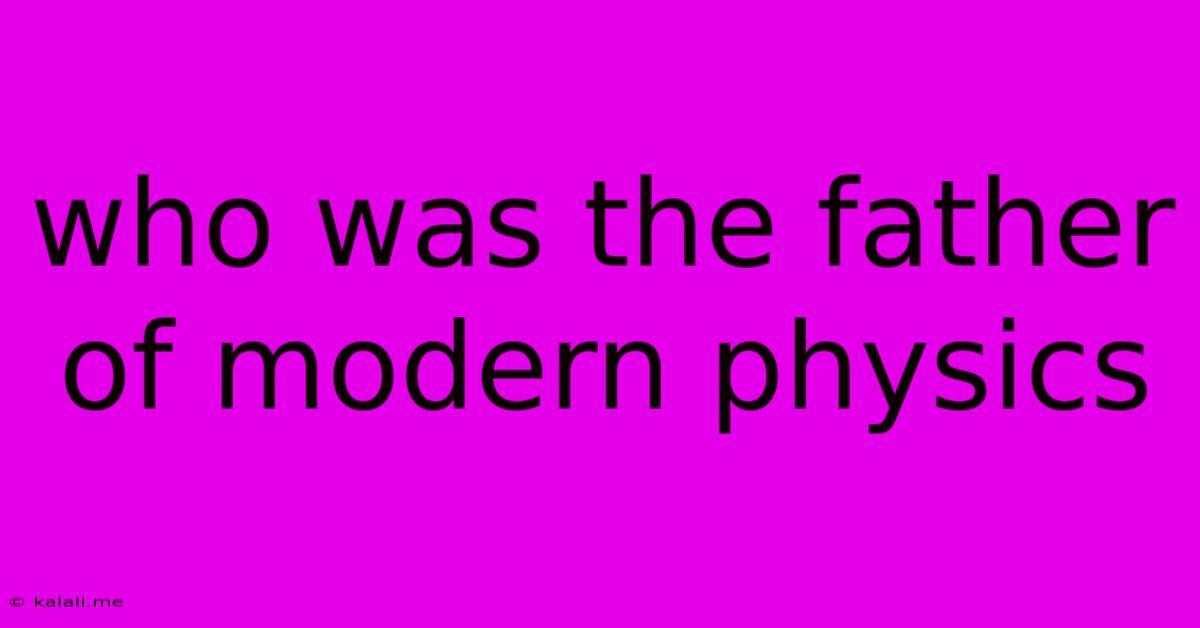Who Was The Father Of Modern Physics
Kalali
Jun 13, 2025 · 3 min read

Table of Contents
Who Was the Father of Modern Physics? The Enduring Legacy of Albert Einstein
The title "Father of Modern Physics" isn't formally bestowed, but if anyone deserves it, it's Albert Einstein. His revolutionary theories fundamentally reshaped our understanding of space, time, gravity, and the universe itself, paving the way for countless advancements in physics and beyond. This article delves into Einstein's contributions and why his impact continues to resonate today.
This article will explore Einstein's groundbreaking theories, their impact on scientific understanding, and his lasting legacy on the field of modern physics. We will also briefly touch upon other significant contributors to the field and why Einstein's contributions stand out.
Einstein's Groundbreaking Theories: Relativity and Beyond
Einstein's most famous contributions are undoubtedly his theories of relativity: special relativity (1905) and general relativity (1915). Special relativity revolutionized our understanding of space and time, demonstrating their interconnectedness and dependence on the observer's relative velocity. This theory introduced the famous equation E=mc², revealing the equivalence of energy and mass, a cornerstone of nuclear physics and our understanding of the universe's energy sources.
General relativity extended special relativity to incorporate gravity, describing it not as a force but as a curvature of spacetime caused by mass and energy. This theory predicted phenomena like gravitational lensing and gravitational waves, both subsequently confirmed by observation, solidifying its place as a cornerstone of modern cosmology and astrophysics.
Beyond relativity, Einstein made significant contributions to other areas of physics, including:
- The photoelectric effect: His explanation of this phenomenon, which earned him the Nobel Prize in Physics in 1921, provided crucial support for the quantum theory.
- Brownian motion: His work on the erratic movement of particles suspended in a fluid provided strong evidence for the existence of atoms and molecules.
- Quantum theory: Though initially skeptical, he contributed significantly to the development of quantum mechanics, particularly through his work on the Bose-Einstein condensate.
Why Einstein is Considered the "Father" of Modern Physics
While many brilliant minds contributed to the scientific revolution that birthed modern physics, Einstein's impact is unparalleled. His theories weren't mere refinements of existing models; they represented a radical paradigm shift, fundamentally altering our understanding of the universe at its most basic level. His work opened up entirely new avenues of research, leading to breakthroughs in numerous fields, including:
- Cosmology: Our understanding of the universe's origin, evolution, and structure is deeply rooted in Einstein's theories of relativity.
- Astrophysics: From black holes to gravitational waves, many key astrophysical phenomena are explained by Einstein's work.
- Nuclear physics: E=mc² is the foundation of nuclear energy and weapons technology.
- Quantum mechanics: While initially resistant, his contributions were crucial to the development of quantum theory.
- GPS technology: The accuracy of GPS systems relies heavily on corrections for the effects of both special and general relativity.
Other Key Figures in the Development of Modern Physics
It's crucial to acknowledge the significant contributions of other physicists during this revolutionary period. Names like Isaac Newton, Max Planck, Niels Bohr, Werner Heisenberg, and Erwin Schrödinger all played vital roles in shaping modern physics. However, the breadth and depth of Einstein's contributions, their transformative impact on multiple branches of physics, and their continued relevance solidify his claim as the "Father of Modern Physics."
Einstein's Enduring Legacy
Albert Einstein's legacy extends far beyond his scientific achievements. He was a passionate advocate for peace, social justice, and international cooperation, leaving behind a powerful message of intellectual curiosity, ethical responsibility, and the pursuit of knowledge for the betterment of humanity. His name remains synonymous with genius and innovation, inspiring generations of scientists and thinkers alike. His contributions continue to shape our understanding of the universe and drive research to this day, securing his position as a pivotal figure in the history of science.
Latest Posts
Latest Posts
-
What Is The Science Of Mapmaking Called
Jun 14, 2025
-
Ts Diagram For Vapour Compression Cycle
Jun 14, 2025
-
Find The Output Of The Following Program
Jun 14, 2025
-
40 Percent Of What Number Is 60
Jun 14, 2025
-
What Is The Chemical Name For Chalk
Jun 14, 2025
Related Post
Thank you for visiting our website which covers about Who Was The Father Of Modern Physics . We hope the information provided has been useful to you. Feel free to contact us if you have any questions or need further assistance. See you next time and don't miss to bookmark.